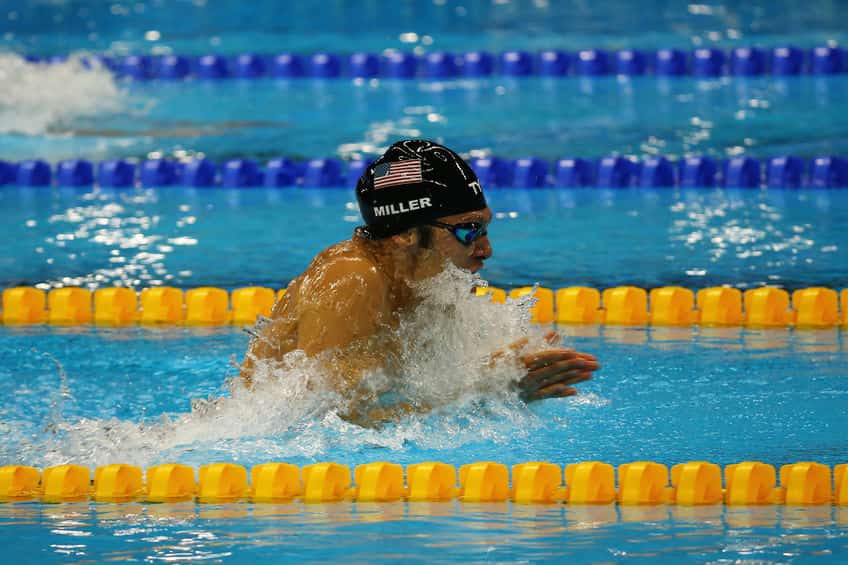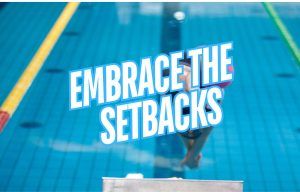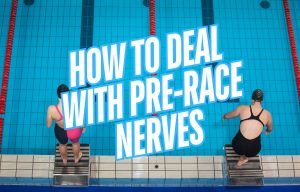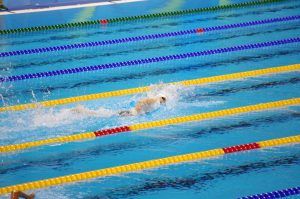
6 Benefits of Visualization for Swimmers
Wondering what visualization can do for your swimming? Here are some evidence-based benefits of visualization for swimmers for more confidence, less choking, and even better technique.

Are you leaving your training and racing to chance? Here’s how a mental plan can help you overcome the big three mindset issues swimmers face.
It’s funny how far we will go with some things in our training in terms of preparation.
We will research the best supplements. The fastest tech suits. The best swim cap. Heck, we’ll even devote hours to completely shaving our bodies in order to gain the slightest bit of advantage.
But when our performance craters, or the times don’t match up to expectations, it’s usually nothing to do with any of those things.
It’s not because you missed that patch of hair behind your knee. Or the racing suit “only” having 76% lycra.
Rather, it’s the choking. The fear of failure. An inability to deal with adversity at crunch-time. The lack of focus.
Those are the things we should be preparing for and spending more energy on.
And yet, for a massive number of swimmers, we don’t.
We prefer the white-knuckle, crossed-fingers approach: We show up, and hope to the gods of chlorine that our best performance will show up too.
Mental training finally made simple. Get mentally tougher, choke-proof your races, seriously escalate self-confidence, and much more.
Used by some of the top swimmers and coaches on the planet, Conquer the Pool is the swimmer’s ultimate weapon for a better mindset and faster swimming.
As you can probably guess, there is another approach to this kind of “hope for the best!” strategy.
It doesn’t take a lot of time or effort (but it does take some consistency), and it will help you perform better from top to bottom in the pool. That means less wasted meters, better swim practices, higher levels of focus, more consistent swimming, and yup—devastating performances on race day.
Here are just some of the perks that having a mental plan will give you, the enterprising swimmer who wants to cold-rock their PB’s:
There are three different kinds of mental plans you can put together that will help you in all facets of your swimming:
This includes relaxation strategies, visualization, self-talk. This encompasses the things you do before you get into the water for practice or competition.
Whether you need to dial up the intensity or turn down the anxiety, this is your plan for getting your mind right. Think of it as your personal mental warm-up.
This part of your overall mental preparation includes your warm-up in competition: So, for example, while warming up and doing some short bursts of speed to wake up your fast twitch fibers you’d simultaneously be doing imagery of how you want to look and feel in the water.
Look back at the times where you absolutely crushed it both in practice and in competition. What was your emotional and mental state like prior to getting into the water?
This is the mental approach you take while you are swimming: the goal with this plan is to launch you butt-first into the mental state that helps you swim your best.
This can include how you are going to react if things go south (you miss a flip-turn and push off with your tippy toes), the performance cues you use while swimming (“Easy speed! Loose and fast!”) and how you are going to stay focused when distractions start to get all distractey.
Your task: Write out a list of short and quick performance cues that will help keep you mentally dialed in when you are swimming at a blistering speed.
As an example, one that I have taken to using when 10m away from the wall—to encourage a thoroughly deadly finish—is using the cue, “Hulk smash!”
It’s simple, to the point, and accurately describes the effort I want to be giving at that part of the rep or race.
Yup, the old worse case scenario: you get injured and are out of action for a week of training. Or you completely bomb the first day of a huge meet. Or you have the worst swim practice of your life and it feels like your swim career is now over.
Your mental plan for recovery is exactly as described: all about getting you to bounce back in a flurry.
When this type of mental plan is in place it gives you the confidence to know that you can confront and overcome setbacks in the pool. Most powerfully, it gives you a sense of control even though what might have happened to you might not be in your control.
Although you are in the middle of a hurricane of adversity, you have your go-to checklist for swimming straight out of it like a torpedo.
Standing up and persevering in the face of adversity is a hallmark of champion swimmers and having a recovery plan is designed to boost your resilience to the down moments in our swimming.
Here are some random ideas of what you could put in your own bounce back plan:
When you are having a bad practice:
When you stink up the first night of finals at the big meet:
Yeah, I know. Sitting down and writing this stuff out probably isn’t all that fun. Kinda like homework, probably.
But make no mistake, the confidence and fearlessness you get from having this kind of plan will take you and your swimming a long way. Additionally, you could easily fit all three of these mental plans onto less than one sheet of paper, so there isn’t really an excuse…especially when you consider the pay-off involved.
Just like putting in all the meters, spending all that time in the weight room, and making good food choices even when no one would be the wiser, being mentally prepared is a critical part of how you end up executing your race.
I’ll leave you with the words of legendary golfer Jack Nicklaus, who viewed being wholly prepared as the fuel for his self-belief and confidence, “As long as I’m prepared, I always expect to win.”
This Mental Training Workbook Will Help You Swim Like a Rock Star This Season. Confused about mental training? Want to unleash pro mode on your swimming this year? Learn how this mental training workbook will change your mindset and help you pummel your PB’s this season.
Why Change is So Hard in the Pool (and How to Make It Easier). We all want change in some measure—so why is it so dang difficult to make happen? Here’s the reality behind making change that actually sticks in the pool.

Olivier Poirier-Leroy Olivier Poirier-Leroy is the founder of YourSwimLog.com. He is an author, former national level swimmer, two-time Olympic Trials qualifier, and swim coach.
✅ Free shipping on Orders over $49
✅ Price Match Guarantee
✅ Best selection of gear for training and competition
✅ Fast and Easy Returns

“This is the best book I have ever seen concerning mental training.” — Ray Benecki, Head Coach, The FISH Swim Team


Wondering what visualization can do for your swimming? Here are some evidence-based benefits of visualization for swimmers for more confidence, less choking, and even better technique.

Ready to uncork some best times at your next swim meet? Here’s what you need to know to prepare for a swim meet.

The right mental skills can help you unlock faster swimming on race day. Here is a look at the right skills to use for competition.

Frustrated with setbacks in the pool? Here are some tips for improving your ability to embrace setbacks and swim faster.

Struggling to swim fast under pressure? Here are some tips for how to manage pre-race nerves on race day.

Swimmers often find themselves stuck with doubt when it comes to doing tough things in the water. Here’s a simple question to ask when you find doubt and uncertainty stopping you from excellence.
SITE
SHOP
GUIDES

LANE 6 PUBLISHING LLC © 2012-2025
Join 33,000+ swimmers and swim coaches learning what it takes to swim faster.
Technique tips, training research, mental training skills, and lessons and advice from the best swimmers and coaches on the planet.
No Spam, Ever. Unsubscribe anytime.
